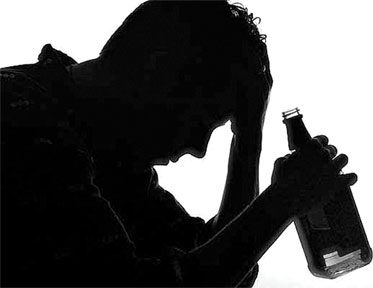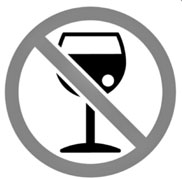Clergy's role in preventing alcoholism
By Lionel WIJESIRI
The latest report issued by the National Dangerous Drugs Control
Board has disturbing information. Their Handbook of Drug Abuse
Information Ė 2011 indicates that ďalcohol cultureĒ has clearly
penetrated every strata of our society and infiltrated intricately into
the social framework of our country. In the past few years - consumption
wise - there has been a 12 percent increase in arrack, 52 percent
increase in toddy and 29 percent increase in malt liquor.
  These are disturbing signs. Today, it seems that drinking is woven
into the fabric of our society - sharing a bottle of arrack over a meal,
going out for a beer with friends, celebrating special occasions with
wine. Because alcohol is such a common, popular element in many
activities, it can be hard to see when a personís drinking has crossed
the line from moderate or social use to problem drinking. These are disturbing signs. Today, it seems that drinking is woven
into the fabric of our society - sharing a bottle of arrack over a meal,
going out for a beer with friends, celebrating special occasions with
wine. Because alcohol is such a common, popular element in many
activities, it can be hard to see when a personís drinking has crossed
the line from moderate or social use to problem drinking.
Alcohol-related myths
Alcoholism and alcohol abuse are due to many inter-connected factors
including genetics, how one is raised, social environment, and emotional
health. People who have a family history of alcoholism or who associate
closely with heavy drinkers are more likely to develop drinking
problems. Finally, those who suffer from a mental health problem such as
anxiety, depression, or bipolar disorder are also particularly at risk,
because alcohol may be used by them as self-medication.
Since drinking is so common in our culture and the effects vary so
widely from person to person, itís not always easy to figure out where
the line is between social drinking and problem drinking. The bottom
line is how alcohol affects each person.
There are five myths about alcoholism and alcohol abuse:
No1: I can stop drinking anytime I want to.
Wrong! One in hundred can, but ninety-nine cannot. Either way, itís
just an excuse to keep drinking. The truth is, you donít want to stop.
No 2: My drinking is my problem. Iím the one it hurts, so no one has
the right to tell me to stop.
Wrong! You are deceiving yourself if you think that your drinking
hurts no one else but you. Alcoholism affects everyone around you -
especially the people closest to you. Your problem is their problem.
No 3: I donít drink every day, so I canít be an alcoholic OR I only
drink wine or beer, so I canít be an alcoholic.
Wrong! Alcoholism is not defined by what you drink, when you drink
it, or even how much you drink. Itís the adverse effects of your
drinking that define a problem. If your drinking is causing problems in
your home or work life, you have a drinking problem - whether you drink
daily or only on the weekends, or just a bottle of beer a day.
No 4: Iím not an alcoholic because I have a job and Iím doing fine.
 |
|
Alcoholism affects everyone
around you, especially family |
Wrong! You donít have to be jobless or homeless to be an alcoholic.
Many alcoholics are able to hold on to their jobs and provide for their
families. Some are even able to excel. However, just because youíre a
high-functioning alcoholic doesnít mean youíre not putting yourself or
others in danger. Over time, the effects will catch up with you.
No 5: Drinking is not a ďrealĒ addiction like drug abuse.
Wrong! Alcohol is a drug, and alcoholism is every bit as damaging as
drug addiction. Alcohol addiction causes changes in the body and brain,
and long-term alcohol abuse can have devastating effects on your health,
your career, and your relationships.
Religious role
In Sri Lanka, the clergy are a barely tapped resource in preventing
and treating alcohol abuse and addiction. Bhikkhus and priests,
ministers, imams and other religious leaders should become more engaged
in addressing this problem; they should preach about alcohol abuse
issues and incorporate prevention and recovery messages into their
ministry.
Many individuals - especially Catholics and some Protestants - turn
to their parish priest or minister for help in dealing with alcohol
abuse problems. At Sunday Dhamma classes, the clergy should educate
their students to recognise the signs of alcohol abuse and deal with
them. The clergy should familiarise themselves with treatment services
in their communities.
Psychiatrists and other mental health providers are of course free to
hold agnostic and atheistic beliefs, but all should be better informed
of spirituality and religion to help prevent and treat alcohol abuse and
addiction. They should learn of the spiritual and religious resources
available in their local communities and how to take advantage of them.
Healthcare providers should not shy away from discussing their
patientsí spiritual needs and desires; they should be prepared to refer
patients to appropriate clergy or spiritually-based programs to assist
their recovery. A better understanding by the clergy of the disease of
alcohol abuse and addiction - together with a better appreciation by the
medical profession, especially psychiatrists and psychologists, of
religion and spirituality to help patients with this disease - offer a
goldmine for prevention and treatment that can help millions of Sri
Lankans and their families. For many individuals working to shake the
shackles of addiction and hang on to sobriety, sound advice might work.
Ways to influence
Possible ways religion may influence alcohol use and recovery include
establishing moral order, providing opportunities to acquire learned
competencies and providing social and organisational ties.
* Establishing moral order
The key aspects of moral order include: Establishing specific moral
directives or rules of self-control and personal virtue, such as
abstaining from the use of alcohol, tobacco and illegal drugs;
Facilitating spiritual experiences that help solidify moral commitments
and constructive life practices; and Providing role models that, for
example, abstain from alcohol use or have overcome addiction.
* Acquiring learned competencies
 |
|
Special occasions and
achievements are celebrated with alcohol |
Important learned competencies - skills and knowledge - that religion
and faith communities can provide include: Promote spiritual health in
ways that prevent and cure alcohol abuse - providing a shared meaning
system that encourages a positive self-worth, shared values, and life
purpose; fostering self-regulation and problem solving; and promoting
esteem that prevents extreme risk taking and thrill-seeking behaviour;
Community and leadership skills that can be used for religious purposes
and outside of religion (e.g. facilitating recovery groups and designing
prevention programs); Coping skills and social support that can be used
to handle life stressors and resist urges to turn to alcohol as the
solution to everyday problems; and Activities that can increase
knowledge as well as provide alternatives to using drugs.
Training programs
The positive results of a religious or spiritual connection are not
limited to those who attend the temple, mosque or church frequently.
Studies show that people with strong religious beliefs are healthier,
heal faster and live longer than those without them, regardless of their
individual spiritual faith or spiritual practice.
Therefore, it is high time that we call for action to tap into the
power of religion and spirituality to help prevent alcohol abuse and
addiction and improve recovery. In my opinion, three important steps
have to be taken:
* Train the clergy to recognise signs of alcohol abuse and alcoholism
and how to deal with them. The clergy should incorporate prevention and
recovery messages into their ministry and become familiar with treatment
services in their communities.
* Train medical professionals to recognise the importance of
spirituality and take advantage of spiritual and religious resources
available in their local communities.
* Conduct more research to better understand and enhance the
effectiveness of faith-based prevention initiatives and treatment
programs.
The clergyís most important task in relation to the problem of
alcoholism is prevention. In this area it has a tremendous amount of
untouched opportunity. Organised religions have direct contacts with
over half the people in the country. This is more than any other
non-governmental organisation. If a substantial share of the religious
organisations in our country would undertake an enthusiastic and
realistic program of prevention, Sri Lankaís largest public health
problem could be brought under control.
Prevention is the only real solution to the problem. As things are
now we are like Alice in Wonderland, running as hard as we can to stay
at the same place. (Actually we are falling behind.) Alcoholics are
being created wholesale while all the therapeutic agencies together are
able only to treat them retail. As the great Japanese thinker, Toyohiko
Kagawa once said, regarding the problem of slums, this is like building
a rescue station at the bottom of a cliff to help those who have fallen
over, without working at the top of the cliff to keep others from
falling.
According to reliable information, Sri Lanka has the worldís highest
alcohol consumption rate at 17 litres per capita. Yes, too many are
falling over the cliff into the morass of the sickness of alcoholism
each year. Somehow we must build a fence that will reduce the number of
new alcoholics.
|

